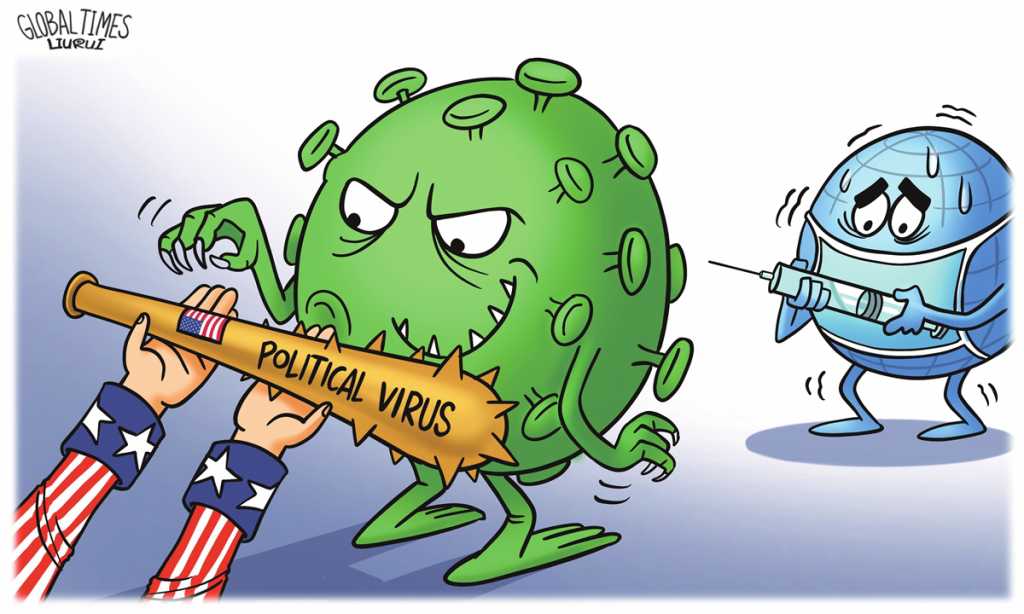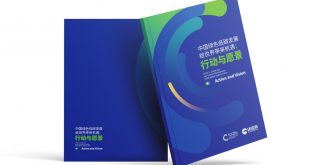
Illustration: Liu Rui/GT
Editor’s Note:
The deadline of the 90-day investigation into the coronavirus origins set by the Biden administration draws near, and US intelligence agencies are reportedly gearing up their efforts to compile a report. Do these intelligence agencies have the ability and reliability to trace where the virus comes from? What consequences will politicizing the origins tracing bring to the world? Global Times (GT) reporters Li Qingqing and Yu Jincui talked to Marcos Cordeiro Pires (Pires), a professor of political economics at Sao Paulo State University, Brazil over these issues.
GT: Regarding the coronavirus origins tracing, you said the US only accepts results that can convict China. Why do you say so?
Pires: First, it is necessary to consider that nowadays, the truth of the facts have been overshadowed by the irrationalism of the so-called post-truth. In this communicational and semiotic framework, facts are distorted in favor of narratives that justify the prejudices associated with a particular political or social project. This is not new and has been gaining strength since the 1980s with the rise of neoliberalism. Today, the evolution of IA (Information Architecture) and social media is reinforced with clear political goals like Q-Anon and its instrumentalization by the Republican Party. Lies are reproduced on a large scale, with the help of algorithms, to create an “alternative truth.” In this regard, China has been unfairly criminalized for having been wrongly accused of leaking the coronavirus, destroying the US jobs, and becoming the new “Evil Empire,” as Ronald Reagan referred to the former USSR.
The anti-China rhetoric created by Donald Trump has become so ingrained in American society that it has become a trap from which Joe Biden cannot escape. Looking at the November 2022 elections, Biden and the Democratic Party are looking to maintain tension with China to rally support. For this, he can’t look weak with China. Furthermore, lobby groups interested in a new Cold War, such as The Committee on the Present Danger: China, or groups that want to change the Chinese socialist system, such as the National Endowment for Democracy or Heritage Foundation, have strongly influenced the political system and, consequently, in the media and public opinion, forcing the government to deal harshly with China.
In this context, the rhetoric that the virus’s origin was an accidental or deliberate leak from a Wuhan laboratory has become almost a consensus. In this sense, any report that says this is false will fall into disrepute because the narrative built on Chinese guilt is already ingrained in public opinion. Thus, even if the investigations were done honestly and presented evidence of the impossibility of the leak, the final report would say “that it is not possible to 100 percent rule out” this hypothesis, leaving room for conspiracy theories.
GT: US intelligence agencies are preparing an investigation report on the origins of the virus and the report will be released soon. The US debacle in Afghanistan has shown the world how inept the US intelligence services were in misjudging the Afghanistan situation. Do these agencies have the ability and reliability to trace where the virus comes from?
Pires: We can never underestimate the investigative capacity of the US intelligence sector. The agencies have a lot of money, technological capabilities, highly educated personnel, and a vast network of collaborators spread worldwide, within governments, media, social institutions, and universities. Edward Snowden’s 2013 leaks showed the coverage of the US intelligence network, which has increased since then due to the evolution of big data and artificial intelligence.
So, if the intelligence services were to seriously address any issue, it is very likely that they would build a report that is well-founded in facts. But that is not what it is about: The information will be politically manipulated to offer the government the narrative that interests the containing China policy because, at this moment, it is what is more convenient to the strategic objectives of the US elites.

Marcos Cordeiro Pires. Photo: Courtesy of Marcos Cordeiro Pires
GT: What influences will a report that aims to convict China have? In your judgment, what will the US do next?
Pires: We assume that the report that will be released on August 26 will be used against China, regardless of the accuracy of its information. If no evidence is found, there will be a caveat that “the Chinese on authorities did not cooperate with the investigations,” so we cannot say that this possibility is 100 percent safe. So they will continue to pressure China in search of a supposed truth that fits the original narrative. There will always be the hypothesis that an “anonymous source close to Chinese authorities” has shown evidence of virus manipulation. Still, that source will never be revealed, leaving the case open. The pressure on the virus’s origin will persist until another event arises to continue putting China on the defensive. This was the logic of the Cold War, and this is the logic that is prevailing today.
GT: For future origins tracing investigations, more than 25 million Chinese netizens have petitioned to probe the US’ Fort Detrick biolab. Some international scholars also believe other countries, including the US, should allow WHO teams to access facilities on their soil. What’s your take on this?
Pires: In a context where mankind faces many global challenges, such as the pandemic, climate change, ocean pollution, and so on, cooperation is the only possible way to solve problems that affect everyone. If, since the beginning of the pandemic, the US had adopted a strategy based on science and international cooperation, the world would suffer much less than today, with 211 million people infected and almost 4.5 million dead. Cooperation and support for multilateralism is the most rational solution available to the international community. However, when the ideal world is confronted with the real world, we see that there are many limitations. The US will never open its chemical weapons laboratory to international inspection, any more than it will allow its citizens to be tried for crimes against humanity by the International Criminal Court. Being by far the hegemonic power, they have the power to dictate their own rules, at least for now. Here is the basis of your double-standard behavior: Do as I say, don’t do as I do!
GT: Have you ever anticipated that the pandemic could be politicized like how it is today? Who is politicizing the pandemic? What consequences will politicizing the issue bring to the world?
Pires: As a Brazilian and researcher, I have reflected a lot on COVID-19 in Brazil and the world. Since March 2020, I have followed the politicization of the issue. At that time, Brazilian citizens of eastern origin (Japanese, Chinese and Koreans) were victims of racist aggression in the streets for accusing them of transmitting the coronavirus.
In mid-2020, we thought that the development of vaccines would overcome the COVID-19 pandemic. But we didn’t count on the denial, lies and anti-vaccination stances spread worldwide by the US far-right groups, which hit hard in Brazil, and how this posture contributed to delaying the fight against it and the spraying of new virus strains.
As we are seeing, the countries that most used science and social mobilization showed the best results in containing the pandemic, such as China, Vietnam, Singapore, or South Korea. On the other hand, in those countries where denial and individualism prevailed, the situation got out of control, such as the US, Brazil, Latin America and Western Europe, which populations have suffered the most from infections and illnesses. Brazil, for example, shows a death rate that reaches 2,700 per million.
Concerning the latter, the far-right groups have sought to boycott any collective action, in addition to creating false narratives about fanciful medicines, denying the lethality of the virus, and doing anti-vaccination campaigns. Besides this, they still accuse China of having made the “Chinese virus” for geopolitical and economic purposes and defame Chinese vaccines. These problems go on.
GT: Brazil was one of the earliest countries which approved the use of Chinese COVID-19 vaccines and has carried out sound cooperation with China in this regard. When it comes to the origins tracing and opposing the politicization of the issue, what kind of cooperation do you think could the two countries conduct?
Pires: As we mentioned above, the theme of COVID-19 in Brazil is highly politicized, especially by President Jair Bolsonaro and his far-right supporters. During the pandemic, Bolsonaro, his family, and his followers attacked China, Ambassador Yang Wanming, and governors seeking to establish partnerships with China.
Bolsonaro has already been proud to be called the “Trump of the Tropics,” and, since 2019, he has had a bad government, not just in managing the pandemic. By the way, a Parliamentary Inquiry Commission is underway in the Federal Senate, which has revealed numerous crimes committed by its government, including blaming and delaying the purchase of Coronavac vaccines, developed by the Sinovac laboratory. Today Bolsonaro threatens the country with a coup d’état that will guarantee him power indefinitely. But Brazilian society is on alert.
Even considering that Bolsonaro blocked the dialogue with China, there is much room for bilateral collaboration, as Brazil is much larger and more complex than the current ruler. State governments, the National Congress, the Judiciary, state governors, capital mayors, universities, research laboratories, and companies have greatly valued their relationship with China. There are common themes in which the dialogue is very fluid, such as trade, investments, scientific research, and the New Development Bank management. As soon as Jair Bolsonaro’s government passes, relations between Brazil and China will return to the historical axis of cooperation and mutual respect.
www.globaltimes.cn
 Africa -China Review Africa -China Cooperation and Transformation
Africa -China Review Africa -China Cooperation and Transformation
